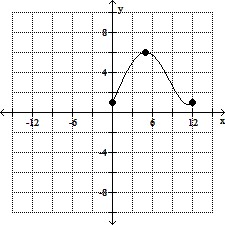Use the graph of the function to find the following: a. the domain and range of the function; b. the intercepts, if any; c. the indicated function values; and d. the value of x given the function value. c. Find f(0), f(1), and f(12).d. Solve f(x) = 6.
c. Find f(0), f(1), and f(12).d. Solve f(x) = 6.
What will be an ideal response?
a. Domain: [0, 12]; Range: [1:6]
b. x-intercept: none; y-intercept: 1
c. f(0) = 1, f(1) = 2, f(12) = 1
d. {5}
You might also like to view...
Solve.Expand  in a half-range cosine series for
in a half-range cosine series for 
A. 14 - 

B. 14 - 

C. 14 - 

D. 14 - 

Solve by the quadratic formula. Simplify answers. Use i notation for nonreal complex numbers.2x2 + 10x + 5 = 0
A. x = 
B. x = 
C. x = 
D. x = 
Determine if matrix A is invertible.A = 
A. Invertible B. Not invertible
Solve the problem.The time in hours it takes a satellite to complete an orbit around the earth varies directly as the radius of the orbit (from the center of the earth) and inversely as the orbital velocity. If a satellite completes an orbit  above the earth in
above the earth in  at a velocity of
at a velocity of  how long would it take a satellite to complete an orbit if it is at
how long would it take a satellite to complete an orbit if it is at 
/> above the earth at a velocity of  (Use
(Use  as the radius of the earth.)
as the radius of the earth.)
A. 32.43 hr
B. 4.93 hr
C. 199.52 hr
D. 19.95 hr